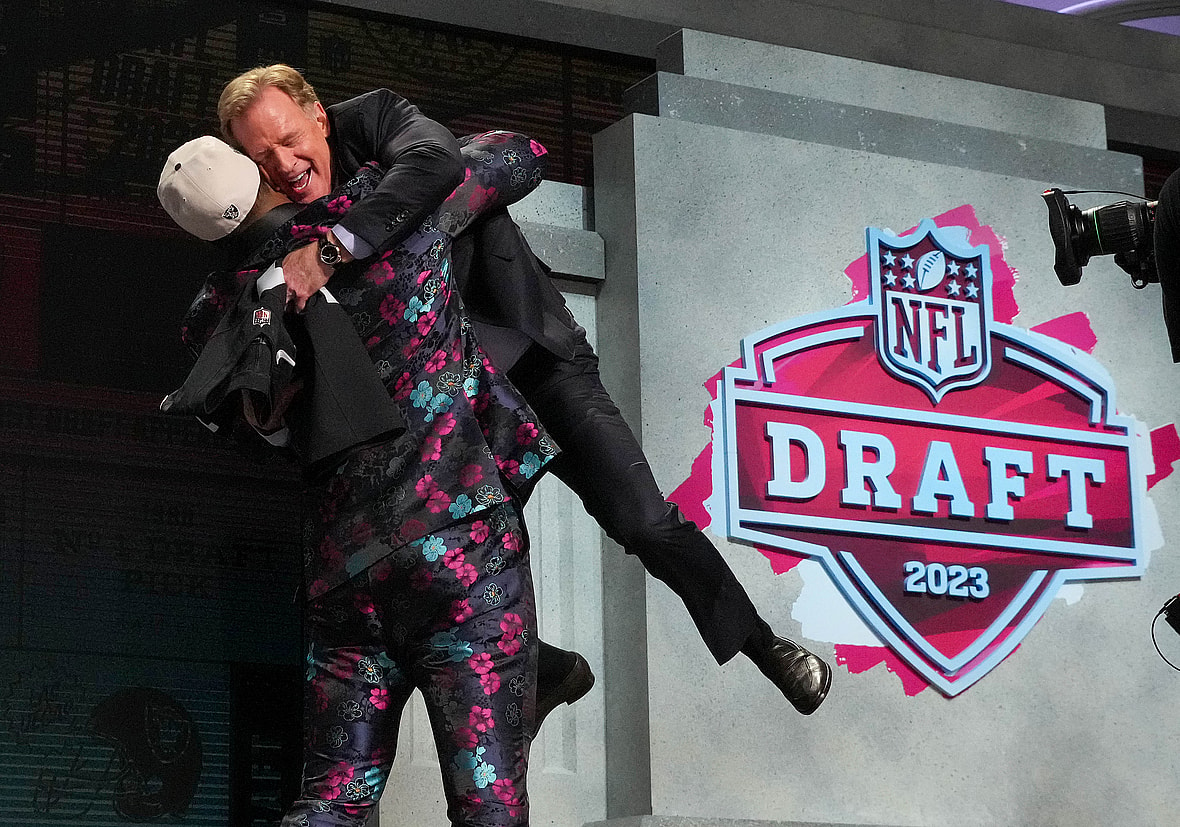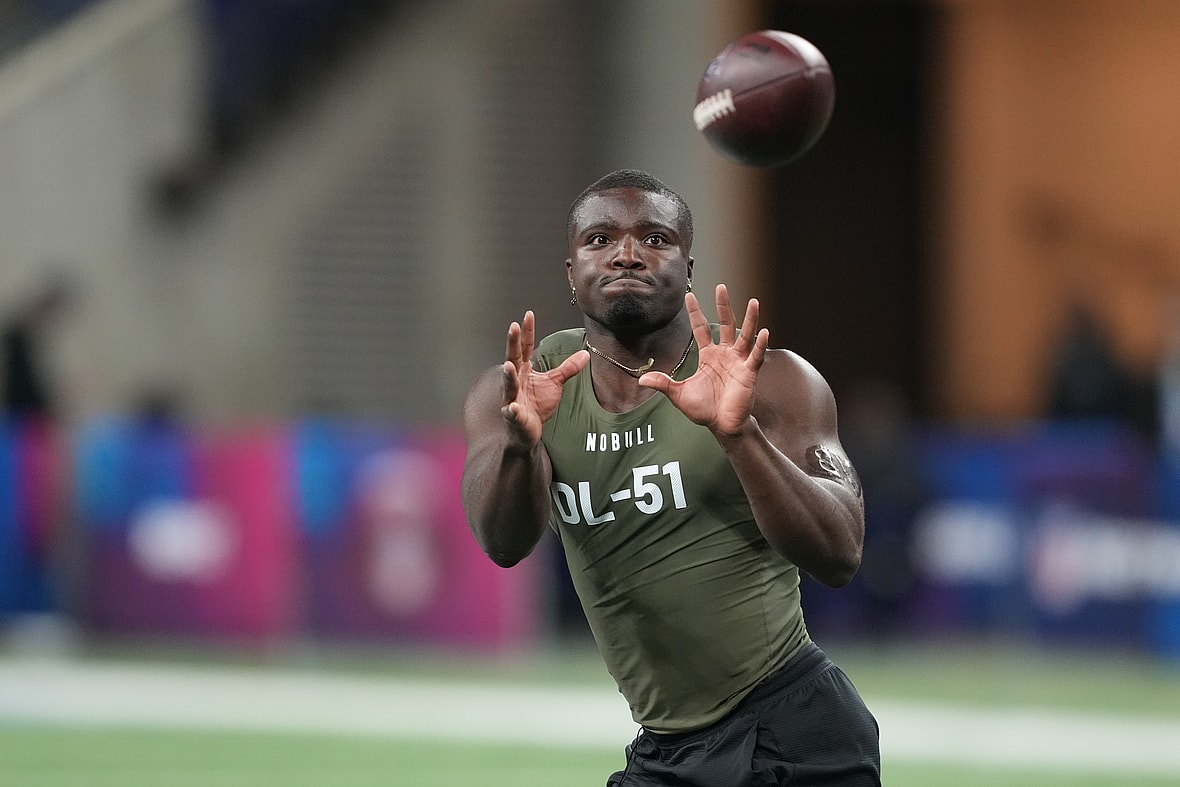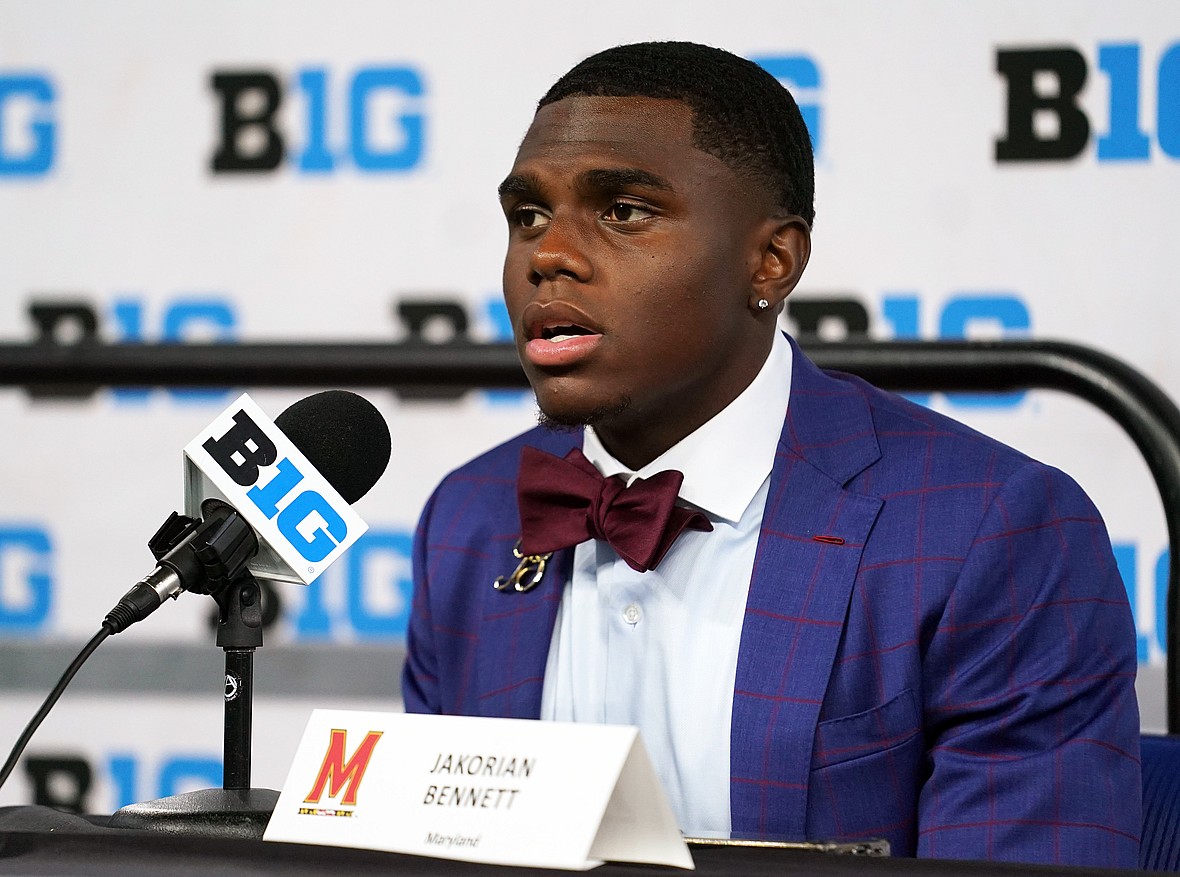After going conservative in free agency, the Las Vegas Raiders made some aggressive moves to fill some of their priority needs. After multiple trades, they finished the draft with nine rookies.
This year, we witnessed general manager Dave Ziegler work with a full slate of draft picks. His willingness to wheel and deal made the Raiders’ draft a little more interesting. He stood pat in the first round, though the front office’s best-player-available (BPA) strategy led to some shrewd maneuvers on Days 2 and 3.
Related: 5 biggest losers from the 2023 NFL Draft – Lions botch Round 1, 49ers’ bad decisions
While we cannot grade the incoming rookie class on production, it’s fair to examine how Ziegler and Co. used the team’s resources to fill roster voids and find players who can provide immediate impact.
Let’s go through the selections, examining how each player fits the roster with a bottom-line grade for each individual day of the draft.
Day 1: Las Vegas Raiders snag D-line building block

On the clock with the seventh pick, the Raiders had two viable options. Remember, the Raiders “crossed off” Jalen Carter on their draft board, though they hosted him for a visit. The Georgia standout pleaded no contest to reckless driving and racing charges and showed up to his pro day out of shape.
The Raiders opted to select edge-rusher Tyree Wilson over cornerback Christian Gonzalez, who fell to the New England Patriots at No. 17.
Gonzalez would’ve been a safer pick, but the Las Vegas Raiders went with Wilson’s upside. He’s a long pass-rusher with an 86-inch wingspan and the versatility to line up anywhere from the outside shoulder of the offensive tackle (5-technique) to the outside shoulder of the offensive guard (3-technique) in a pinch.
In the best-case scenario, Wilson overtakes 33-year-old Chandler Jones on the edge opposite of Maxx Crosby.
Wilson broke out in his final two collegiate years at Texas Tech, registering 14 sacks and 27.5 tackles for loss. He’s not explosive off the line of scrimmage, but the 6-6, 271-pounder will use his active hands and length to free himself or gain leverage. Wilson must develop his pass-rushing plan to make an impact when he’s unable to overpower offensive linemen.
On the pro level, Wilson cannot simply rely on his physical traits to win one-on-one matchups. Fortunately, he’s in good company with Crosby and Jones, who plays at a similar size (6-foot-5, 260 lbs). They can help him refine his technical skill.
The Raiders made their first pick with some risk. Wilson suffered a foot injury that cut his 2022 collegiate short in November. For now, he expects to participate in training camp:
Ultimately, the Las Vegas Raiders’ new defensive building block has the traits to become a Pro Bowl-caliber player. In the meantime, Wilson will focus on recovery to get crucial reps in the summer. The Las Vegas Raiders will need him to supplement the pass rush. Because of the rookie’s versatility, defensive coordinator Patrick Graham can experiment with him on the inside with Jones and Crosby outside on passing downs.
Grade: B+
Day 2: Raiders chase draft value then reach for receiver

The Las Vegas Raiders made a big splash in the second round, moving up three spots from 38 to 35 for tight end Michael Mayer, but they lost steam with the following picks. Let’s start with the good news.
Mayer has a great chance to play a significant number of snaps through his rookie term. The Raiders signed tight end Austin Hooper to a one-year, $2.75 million deal to put a Band-Aid on the tight end position after they traded Darren Waller to the New York Giants in exchange for pick No. 100.
In a quality tight-end class, the Raiders snagged the most well-rounded prospect at the position. At Notre Dame, Mayer racked up 180 catches for 2,099 yards and 18 touchdowns, which illustrates his consistency in a pass-catching role. While he’s not a refined inline blocker, the 6-foot-4, 249-pounder has the body frame and physical demeanor necessary to handle blocking assignments.
Ziegler picked the prospect who was probably the best player available on big boards across the league with the 35th pick. Many draft analysts gave Mayer a shot to go in the first round as the first tight end off the board.
By the way, Jimmy Garoppolo formed an effective rapport with tight end George Kittle during his time with the San Francisco 49ers. With Garoppolo healthy under center, Kittle earned three Pro Bowl nods and put together an All-Pro campaign in 2019. Ziegler definitely put a smile on his new quarterback’s face.
The Las Vegas Raiders exercised patience and stood pat with pick No. 70—their first of two third-round selections. They added Alabama’s Byron Young to their defensive line room.
Young certainly fills a need on the front line. He’s a potential run-stuffing replacement for Johnathan Hankins, whom the team traded to the Dallas Cowboys during the 2022 season. Because of his ability to take on double teams, Young can complement Jerry Tillery when Bilal Nichols isn’t on the field.

At 6-foot-3, 294 pounds, Young became a high-level run-stopper at Alabama, but he may have to bulk up a bit to dominate in that role on the pro level. Moreover, Young only has one year of notable pass-rushing production and lacks the athleticism to consistently beat offensive linemen when it’s time to pressure the quarterback.
Ziegler could’ve targeted quality prospects at cornerback or linebacker with the 70th pick, but instead, he went with a rotational defender who will likely play less than 50 percent of the defensive snaps with Bilal Nichols, Jerry Tillery, Neil Farrell Jr., Matthew Butler, Adam Butler, and John Jenkins all pushing for playing time along the front line.
The Las Vegas Raiders wrapped up its Round 3 picks with a head-scratcher, selecting slot receiver Tre Tucker out of Cincinnati. In 2022, Tucker had his best collegiate season with 52 catches for 672 yards and three touchdowns. More notably, he’s an excellent kick returner with 67 returns for 1,670 yards and two touchdowns in four years on campus.
Tucker’s arrival in Vegas raises questions about Hunter Renfrow’s future with the team.
After signing Jakobi Meyers and DeAndre Carter in free agency, the Las Vegas Raiders have added another receiver who plays a significant number of snaps in the slot, which creates a logjam at the position. In the Bearcats’ offense, Tucker operated almost exclusively out of the slot.
Because of his top-gear speed, Tucker will bring immediate juice to the special teams unit on kick coverage and returns, but he’s more of a late-round talent than a late Day 2 pick. Vegas reached for him and continued to ignore glaring holes in its defense. Simply put, Ziegler whiffed on the value of the 100th pick in the draft.
Grade: B-
Day 3: Las Vegas Raiders fill needs with an aggressive approach

Coming into the draft, the Raiders had 12 picks, which allowed them to be aggressive in trading up for their targets on Day 3. In a calculated approach, Ziegler made sure to get his guys. Vegas traded up for three of its five selections between Rounds 4 and 7.
With the second pick in the fourth round, the Las Vegas Raiders selected Jakorian Bennett, who’s the lesser-known cornerback out of Maryland. Opposite of Deonte Banks, Bennett developed a knack for finding the football, recording 22 pass breakups and five interceptions over the past two years.
Bennett must refrain from pulling and grabbing on receivers downfield to cut down on penalties, though his aggressive demeanor is what allows him to make plays on the ball. At 5-foot-11, 188 pounds with 4.3 speed, he has decent size with the athleticism to start on the boundary. If Bennett finds the football at training camp and the preseason, he has a good chance to start alongside Nate Hobbs, a fifth-round pick from 2021.
With the last pick in the fourth round, McDaniels found his developmental quarterback who will replace Jarrett Stidham in Aidan O’Connell.
O’Connell doesn’t fit the mold of a modern-day quarterback. He’s not elusive in the pocket and lacks the mobility to evade pressure. However, the Purdue standout shows poise and decisiveness with a quick release. He’s also incredibly accurate with throws in the short-to-intermediate areas of the field, which is paramount in McDaniels offense.
McDaniels may have to update his idea of an effective quarterback in today’s league with so many signal-callers able to compensate for subpar pass blocking, but he definitely selected a passer who fits his preference.
For a third consecutive pick on Day 3, the Las Vegas Raiders moved up for Christopher Smith, who likely fell into the fifth round because of poor testing numbers. He recorded a below-average athletic score (54).
Yet anyone who’s watched Smith’s play will tell you that his instincts and football IQ offset his athletic shortcomings. He knows how to find the ball, recording nine pass breakups and six interceptions over the past two years. The Georgia product can also be a tone-setter with physical play in the box against the run.
In order to mask Smith’s subpar physical profile and optimize his ability to read quarterback, he’s best in a deep safety role in center field in off-man coverage. The Las Vegas Raiders need a defensive back who’s going to be in the right spot at the right time to force turnovers, and Smith could be that guy.
Ziegler stood pat for his last two selections, taking linebacker Amari Burney and defensive tackle Nesta Jade Silvera in the sixth and seventh rounds, respectively.
As a sixth-rounder, Burney has a unique opportunity to play a lot in his rookie term because the Las Vegas Raiders lack high-end talent at linebacker. He’s a former safety with zone coverage skills that can keep him on the field on third downs.
Silvera will compete in a crowded room of defensive linemen. He’s athletic and challenges offensive linemen with a quick burst out of his stance. If the Arizona State product develops his pass-rushing skill set, he can see more playing time than expected for a seventh-rounder.
Grade: B